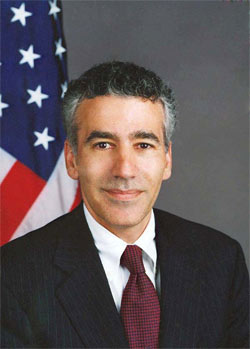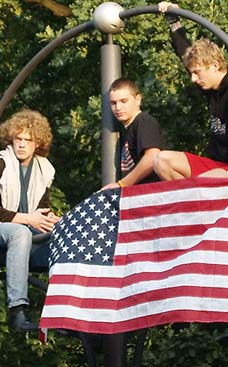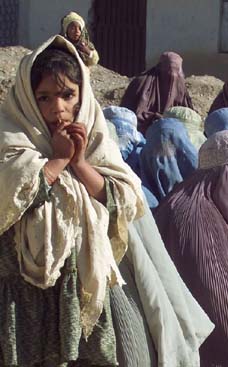
"What happened was that one of our security officers went to brief Peace Corps workers on security [measures] in Bolivia. During the course of that briefing he started going into areas that are ordinarily reserved for direct American employees—which the Peace Corps are not—basically telling them to be careful about third country people who might want to take advantage of them. He should not have gone over that ground, but it was not a request for them to do anything. And this has been blown up way out of proportion. A minister of government tried to blame us for all kinds of spying scandals, with which we had nothing to do. Our security officer should not have mentioned this area and as a result left the country at our request. And that was the sum total of it. It was a mistake. The person paid for the mistake, but it was in no way, no way, an effort to spy on anyone."
PCOL Comment: Read more about allegations that Peace Corps volunteers were asked to 'spy' by an embassy official during Philip S. Goldberg's tenure as US Ambassador to Bolivia.
Ambassador Philip S. Goldberg explains why he was expelled from Bolivia, only the eighth time in history that a U.S. chief of mission has been ousted from duty
Grandstanding
Bolivia and other Latin American countries are distancing themselves from the direction that the rest of the world is taking.
By Mac Margolis | Newsweek Web Exclusive
Sep 20, 2008 | Updated: 12:35 p.m. ET Sep 20, 2008
On September 11, as violent political and social convulsions shook Bolivia, president Evo Morales declared senior U.S. diplomat Philip S. Goldberg persona non grata, accusing him of sanctioning spying on Bolivian nationals, and then attacked him on nationwide television. Goldberg's expulsion marked a low point in the increasingly strained relations between Washington and La Paz, and only the eighth time in history that a U.S. chief of mission has been ousted from duty. Goldberg has had challenging assignments before—he was posted as chief of mission to Kosovo in 2004, when ethnic tensions were still smoldering, and before that served on the State Department's Bosnia Desk and as special assistant to Ambassador Richard Holbrooke. But no job was as trying as running the embassy in Bolivia. Goldberg recently spoke from Washington by telephone with NEWSWEEK's Mac Margolis on what's in store for Latin America's most conflicted nation. Excerpts:
Newsweek: There's been a lot of media on your expulsion from Bolivia. What was the official reason and how did it happen?
Goldberg: I was in a meeting [on Sept. 10] with the Bolivian foreign minister. I had gone to see him after receiving a call from the Bolivian government informing me that our D.E.A [drug enforcement agency] personnel had to leave immediately from the Chapare region, where president Evo Morales is also the president of the coca growers federation. During that conversation, Morales called the minister's cell phone to say that he had just announced—at a public event, not through the normal diplomatic channels—that he was declaring me persona non grata. The official notification arrived the following day.
The State Department has stated essentially that whenever things are not going well in Bolivia or in Venezuela, their leaders try to distract attention. Is that a fair interpretation of your ouster?
I think that's an important factor. The situation in Bolivia had deteriorated to the point of confrontation. And I think it became very easy to blame the United States for that. Secondly, I think there were external factors at work.
External factors meaning Venezuela?
Yes, you can probably say that. This wasn't just one day in coming. I had been the subject of really outrageous attacks for some time. So had the United States as well as the USAID program and the Peace Corps. This wasn't a new tactic. It was part of the general policy of the Bolivian government for Morales to attack the United States.
One version circulating in Bolivia is that the U.S. diplomatic mission in Bolivia was said to be caught instructing some 30 American aid workers and a scholar to spy on Venezuela and Cuban medical workers. Is there any truth to this?
That interpretation is quite at variance with what exactly happened. What happened was that one of our security officers went to brief Peace Corps workers on security [measures] in Bolivia. During the course of that briefing he started going into areas that are ordinarily reserved for direct American employees—which the Peace Corps are not—basically telling them to be careful about third country people who might want to take advantage of them. He should not have gone over that ground, but it was not a request for them to do anything. And this has been blown up way out of proportion. A minister of government tried to blame us for all kinds of spying scandals, with which we had nothing to do. Our security officer should not have mentioned this area and as a result left the country at our request. And that was the sum total of it. It was a mistake. The person paid for the mistake, but it was in no way, no way, an effort to spy on anyone.
How serious is the political and social unrest in Bolivia and what's at stake?
Obviously it's very serious. There were confrontations and a number of deaths. I think the region is clearly concerned about what's going on. There are issues related to general stability in Bolivia. Drug trafficking is another. There are issues related to gas supplies, especially for Brazil and Argentina, which are recipients of Bolivian gas. Bolivia's problems are a deep concern to Latin America.













